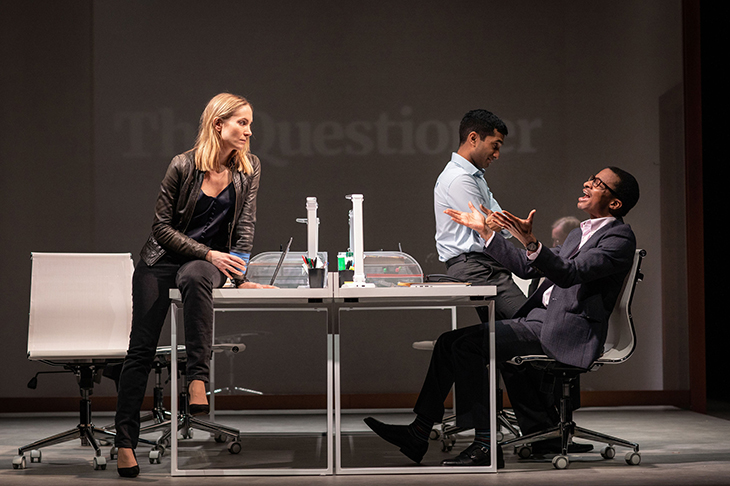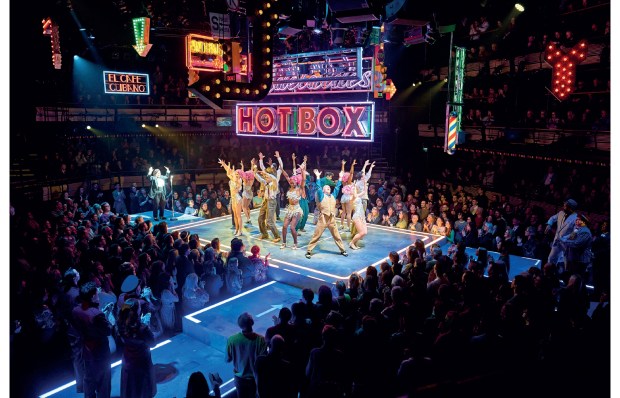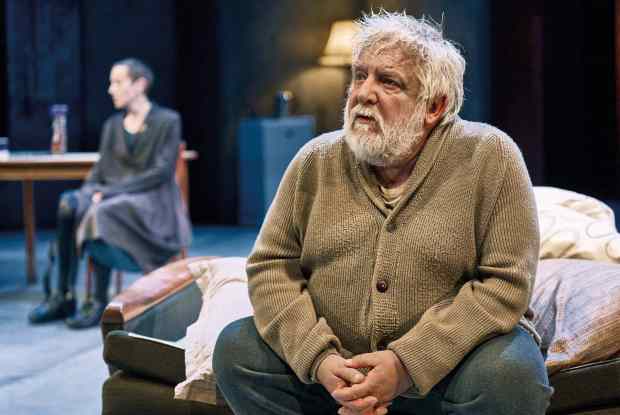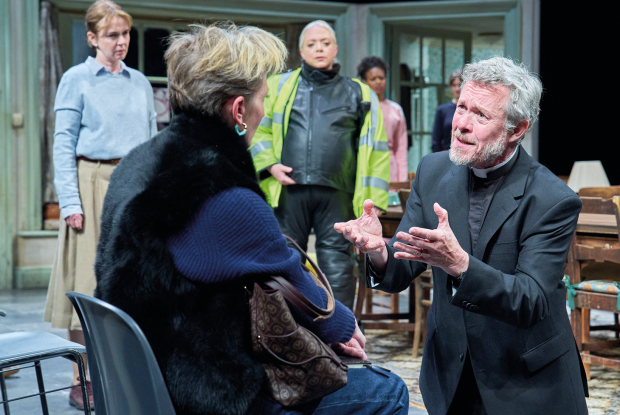Nicholas Hytner’s new show, Alys, Always, is based on a Harriet Lane novel that carries a strong echo of Brideshead. A well-educated journalist, Frances, becomes entangled with the wealthy Kyte family (the closeness to ‘Flyte’ is doubtless intentional), and she befriends the silly daughter, Polly, before setting her sights on the enigmatic father, Laurence, a famous scribbler who never gives interviews. This slow-moving tale is intercut with scenes from Frances’s day job at a failing newspaper where the staff keep getting the boot.
But Frances, mystifyingly, retains her post. How come? Floppiness is her most conspicuous quality. She’s a watchful sponge with no wit, charm or intellect, and for most of the action she lacks any real purpose other than to hang around the place, chatting. She has many secondary characteristics, far more than is usual for a dramatic figure, and all of them are feebly delineated. She’s a liar but her fibs are negligible. She’s a social climber who ascends barely half a rung above the class from which she began. She’s an occasional thief who targets minor items not valued by their owners. She’s ambitious at work but she succeeds through luck rather than talent or guile. Sexually she’s inert but for the effortless seduction of a fat bald old git (the scribbler), and their romance vaporises like a gnat’s burp as they swap physical passion for domestic torpor. Socially she’s a clingy nuisance and yet her clinginess is at about Post-It note level. And her obsession with the Kytes, on which the entire play turns, is a hobby rather than a mental disorder.
The supplementary characters are more engaging. Simon Manyonda plays Frances’s enjoyably fruity colleague, Oliver, and Leah Gayer has fun as Polly, a posh thicko from drama school who wants to do Shakespeare in scout huts and then decides she can’t be bothered. I felt sorry for Robert Glenister (Laurence) playing a bumbling sugar daddy whose appeal is based purely on cash and social pedigree. He may be a talented writer but he keeps his gifts well hidden. And it’s obvious why he never gives interviews: his brain is devoid of original matter. Fans of the novel will enjoy this show but they might prefer a TV adaptation. So would the designer, I suspect, who uses minimal furnishings and colour photographs projected on to the rear wall to indicate each change of scene. These photos look nice and are topographically accurate but theatre design should be more than a slideshow.
Nicholas Hytner might have taken his creative team to learn a few lessons from Waitress. This Broadway import grabs our attention instantly by giving us straightforward, likeable characters whose aims are simple to comprehend. We meet three serving girls working in a rural diner: Becky is a sexpot who wants to keep her fling with a co-worker secret. Shy Jane must conquer her self-doubt and find a boyfriend. Pregnant Jenna wants to end her marriage to a thuggish husband and seduce her dashing gynaecologist.
The opening hour of the show is a magical synthesis of burlesque comedy, raw emotion and thumping great tunes to hum along with. The principles are brilliant all-rounders. Laura Baldwin’s Dawn fizzes with sexual paranoia. Marisha Wallace (Becky) is a cauldron of libidinous self-confidence, and Katharine McPhee (Jenna) is blessed with film-star looks and a voice large enough to turn the tide. David Hunter wins harrumphing laughs as the handsome Dr Pomatter and Peter Hannah shines in the thankless role of Earl, the drunken husband, who steals his wife’s tips and threatens her with violence.
By the end of the first half the story seems to have peaked. Becky’s secret is out. Jane has found love with an amusingly pedantic nerd (played by Jack McBrayer, perhaps overdoing the self-adoration), and Jenna is having the time of her life on her doctor’s couch. What next? After the interval, the laughs recede and the story becomes more emotional as the baby arrives and Jenna confronts her boyfriend/husband crisis. The crowd couldn’t wait for the horrible Earl to get what he deserved, and when it came the moment was greeted with whoops and cries from the stalls.
That, I suspect, is what the all-female creative team meant when they called this a ‘feminist’ production. It doesn’t look that way to an outsider. Jenna and chums conform perfectly to a Stone Age model of womanhood. They provide food, babies and sexual comfort to men who control all the wealth and opportunity available. Jenna’s ultimate dream is to win financial freedom by entering a pie-baking contest. The kitchen, in other words, marks the limit of her ambition. Parents taking their kids to Waitress may want to highlight its rather narrow sociopolitical outlook. And there will be many such parents. This sensational show feels like it’s in the West End for keeps.
Got something to add? Join the discussion and comment below.
Get 10 issues for just $10
Subscribe to The Spectator Australia today for the next 10 magazine issues, plus full online access, for just $10.
You might disagree with half of it, but you’ll enjoy reading all of it. Try your first month for free, then just $2 a week for the remainder of your first year.














Comments
Don't miss out
Join the conversation with other Spectator Australia readers. Subscribe to leave a comment.
SUBSCRIBEAlready a subscriber? Log in